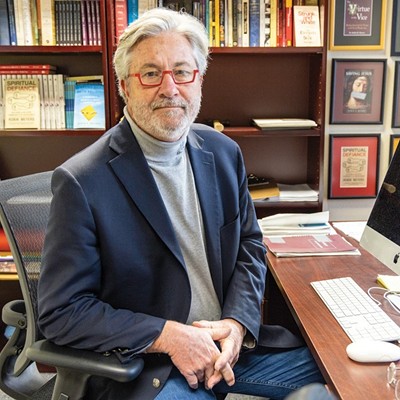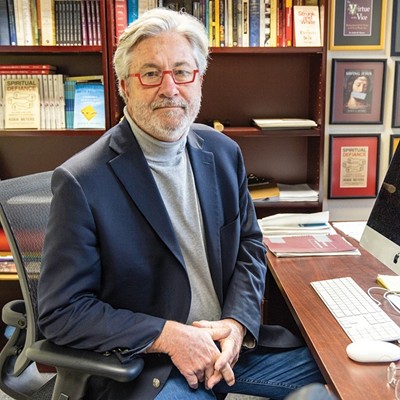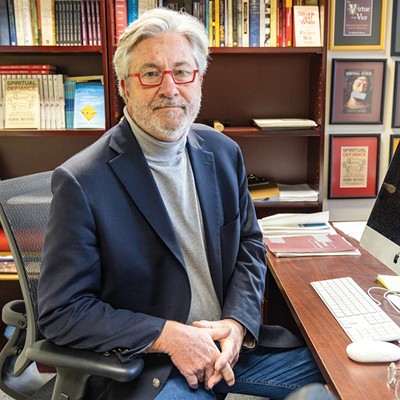I recently ran across an amazing article in the New York Times that confirms much of my growing ambivalence about teaching in a world of glowing rectangles. It was entitled, “Why Universities Should Be More Like Monasteries,” by Molly Worthen, a historian at the University of North Carolina who writes about higher education. In it, she details a radical idea whose time has come. Namely, that instead of making the college experience more and more like the world, it should be a chance to withdraw from it, as if students were entering a kind of intellectual monastery. It blew my mind, and what is quoted here comes from that amazing article.
Not because I’m just an old professor who longs for the good old days when students had to listen to boring lectures, regurgitate what they had committed to short-term memory, and then move on while pretending to have loved every minute of it. No, this is not nostalgia. It is a warning, because the devices we are addicted to are making our students sick, and less capable of critical and imaginative thinking. The evidence is overwhelming. “One recent survey found that 60 percent of American college students reported at least one mental health problem and that 15 percent said they were considering suicide.” What’s more, the more screen time the more significant was the risk of anxiety and depression.
Enter Justin McDaniel, a professor of Southeast Asian and religious studies at the University of Pennsylvania, and a course that students want to take so badly that there is a long waiting list. It’s known on campus as the “monk class.” Students who take it agree to give up all technology, and you can’t talk for a month. Officially called Living Deliberately, students read about different monastic traditions and actually adopt some of the practices. The rules are strict. No makeup or jewelry. Men and women sit separately and wear different “habits.” Nonbinary and transgender students sit with the gender of their choice.
Phones were handed over to the professor. At first, student speech was restricted to 100 words a day, and unlike most get-acquainted exercises early in the semester, students were discouraged from sharing personal information. They were to get to know one another only through the sharing of ideas, mitigating the pervasive ethos of hyper-individualism. New names were assigned to students who had to get up at 5 a.m. and make journal entries every 30 minutes. In a course called Existential Despair, McDaniel convenes students without cell phones to meet once a week from 5 p.m. to midnight in a group setting to read books that, as he put it, “start sad. In the middle they’re sad. They stay sad.” As in real life, not everything has a Disney ending. They talk about tragedy and suffering without a single glowing rectangle to tell them what to think and feel.
This may sound depressing, but these kids understand depression better than most, and now they know that great authors understand it too—like James Baldwin (Giovanni’s Room) and Jose’ Saramago (Blindness). Having come of age in a global pandemic, where something you could not see could kill you or your loved ones, they also know that there are no Tik Tok videos more powerful than the Grim Reaper.
Again, if this sounds dark, it is. But so is watching a grandparent die through a hospital window without getting to say goodbye. To know that all of us will suffer is not a downer. It creates an awareness of the universal human experience and what gifted thinkers and writers can teach us about it. And guess what? These courses have long waiting lists because students are “hungry for a low-teach, introspective experience.”
Higher education, on the other hand, is moving in the opposite direction. Rather than banning cell phones and laptops in class (as I do in mine), we are busy trying to figure out how to use tech addictions to help students learn. Audience response apps are popular, as are ways to let AI, like ChatGPT, into the room as a friend, not a foe, so that students can improve their prompting skills or work from a first draft written by an amoral machine that is the “Cheez Whiz version of human thought.”
It’s true that there are some students who are helped by connecting with peers on social media, and sometimes a cell phone can save your life. But such virtual community support “cannot compensate for the vortex of gossip, bullying and Instagram posturing that is bound to rot any normal person’s self-esteem.” It is almost impossible to stay with any task, any discussion, or any train of thought in a college classroom when pinging notifications never cease, and every text must be responded to immediately. And don’t start with the virtues of multi-tasking please. What we now know is that by trying to doing several things at once, we end up not doing any one thing well.
The good news is that students themselves are beginning to understand that the distraction that is laptops all around them, and the “imaginary string attaching me to my phone, where I have to constantly check it.” Banning these devices, even if only for the duration of the class, is being met more and more with appreciative acquiescence. It’s like children whose parents were wise enough to make and set boundaries—and then enforce them. “Thanks, I needed that,” is often the unstated response.
At the very least, technology should be our servant, not our master. Phones should be banned from our dinner tables and our date nights, so that nothing ever seems more important than our conversation with friends and loved ones. We are losing the ability to focus, to listen, and to be in the moment in large measure because there is a small silicon idol in our pocket. As Tish Harrison Warren put it recently, “None of us were born looking for a screen. We were all born looking for a face.”
Amen.
The Rev. Dr. Robin Meyers is pastor of First Congregational Church UCC in Norman and retired senior minister of Mayflower Congregational UCC in Oklahoma City. He is currently Professor of Public Speaking, and Distinguished Professor of Social Justice Emeritus in the Philosophy Department at Oklahoma City University, and the author of eight books on religion and American culture, the most recent of which is, Saving God from Religion: A Minister’s Search for Faith in a Skeptical Age.
Visit robinmeyers.com












